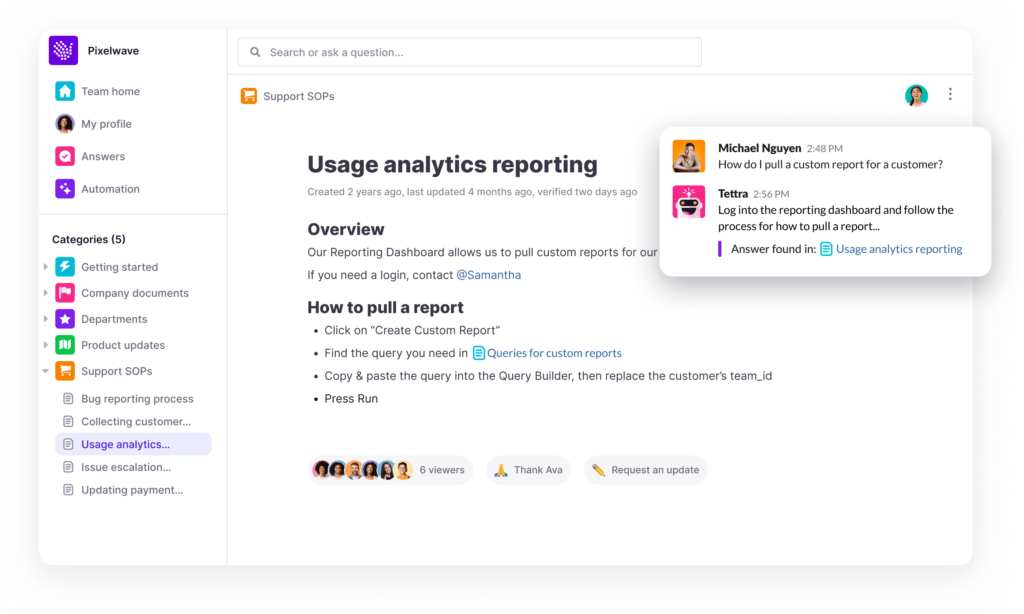Knowledge sharing is an essential practice that enables the transfer of valuable knowledge, both tacit and explicit, to enhance employee development, foster innovation, and drive organizational success.
Knowledge sharing goes beyond simply sharing information; it involves creating a culture that encourages open communication, collaboration, and the exchange of ideas.
By promoting the sharing of knowledge, organizations can tap into the collective intelligence and experiences of their employees, harnessing their diverse skills and expertise to solve problems, improve decision-making, and achieve common goals.
Knowledge sharing is even more important with hybrid and remote work, making it harder to connect and share processes in regular conversations.
1. What are examples of internal knowledge sharing?
Documentation and Manuals
Organizations can encourage knowledge sharing by creating comprehensive documentation and manuals. These resources provide employees with easy access to relevant information and procedures, ensuring consistency and efficiency in their work.
Training Programs
Well-designed training programs facilitate knowledge sharing by providing employees with opportunities to learn from subject matter experts and experienced colleagues. These programs can include workshops, webinars, and online courses to address specific skill gaps and foster continuous learning.
Mentoring and Coaching
Pairing experienced employees with newer ones through mentoring and coaching programs is an effective way to transfer knowledge. This one-on-one interaction allows for personalized guidance, sharing of best practices, and the development of valuable relationships.
Knowledge Bases
Knowledge bases and knowledge management software can serve as centralized repositories of information. These repositories house relevant documents, research findings, case studies, and best practices, making it easily accessible to all employees.
Cross-Functional & Cross-Team Collaboration
Encouraging cross-functional collaboration promotes knowledge sharing across different departments and teams.
By working together on projects, sharing ideas, and leveraging each other’s expertise, employees can gain a broader understanding of the organization and its operations.
2. What topics need to be shared?
At Tettra, we see customers sharing processes, customer support information, operational goals, and a myriad of policies – such as HR and PTO documents.
Here’s a bank of templates that will help you get started in sharing knowledge with your employees. This list isn’t exhaustive and is meant to spur you on to share more and more.
A few of the topics that need to be shared:
- Your team planning cadence (Template)
- Your standard operating procedures (Template)
- Your strategic plan (Template)
- How to build a cost model (Template)
- Your processes (Template)
3. What are the benefits?
Organizations can engage their employees, reduce redundancy, improve decision-making, prevent knowledge loss, spark innovation, and enhance client relationships.
Better Employee Engagement
When employees feel that their knowledge is valued and that they have opportunities to contribute, they become more motivated and committed to their work. This increased engagement leads to higher productivity and job satisfaction.
Knowledge sharing also helps reduce redundancy within an organization. Instead of employees duplicating efforts or reinventing the wheel, they can easily access and build upon the existing knowledge and expertise of others. This saves time and resources.
Informed Decision Making
Informed decision-making is another significant benefit of knowledge sharing. When employees have access to a wealth of shared knowledge and insights, they can make more informed and strategic decisions. This results in better problem-solving, improved outcomes, and increased efficiency.
No Knowledge Loss
Preventing knowledge loss is a critical aspect of knowledge sharing, especially in situations where experienced employees retire or leave the company. This is called knowledge transfer.
By documenting and sharing their knowledge with others, organizations can ensure that essential expertise and information are not lost, preserving institutional knowledge.
Spark Innovation
When employees have access to diverse perspectives, ideas, and experiences, it stimulates creativity and encourages innovative thinking, leading to continuous improvement and growth.
Knowledge networks – or teams of people dedicated to sharing what they know across the organization – can spur on this type of thinking.
4. How do you promote internal knowledge sharing?
Team leaders play a critical role in encouraging knowledge sharing and facilitating the learning process. They can:
Lead by example: Team leaders should actively engage in continuous learning themselves and demonstrate a commitment to knowledge sharing.
Create a collaborative environment: Encourage open communication and create opportunities for team members to share insights and experiences. Facilitate cross-functional collaboration and knowledge exchange.
It’s easy to default to traditional hierarchical structures, but those are quickly crumbling, if they haven’t already.
As Eamonn Kelly, the Chief Futurist at Deloitte notes:
“The default toward traditional hierarchical power models is simple to explain: They’re effective in getting things done and are stable and enduring. But they also tend to lack speed, flexibility, agility, responsiveness, and adaptability—all important qualities in times of significant change. This explains why, over the last few decades, most large organizations have launched initiatives aimed at decentralizing, delayering, empowering, or dissolving silos.”
The collaborative environment means more things are getting done.
Provide guidance and support: Team leaders should offer guidance and support to team members in identifying their learning needs and accessing appropriate resources. They should also provide constructive feedback and mentorship.
When team members actively share their expertise and insights, it creates a collective intelligence that enhances problem-solving, innovation, and decision-making. It fosters a culture of continuous improvement and ensures that the team stays ahead of the curve.
Utilizing knowledge sharing techniques within teams can lead to superior team performance and give organizations a sustainable competitive advantage.
5. How do you build effective knowledge sharing in your business?
Creating an environment where knowledge is freely shared and accessible can be challenging.
It requires a combination of technology, processes, and a supportive organizational culture.
By implementing a robust knowledge-sharing system, organizations can ensure that valuable information and expertise are shared across teams, departments, and even remote workers.
An effective knowledge-sharing process fosters collaboration, enhances decision-making, and promotes continuous learning and development within the organization.
It also helps break down silos, reduce duplication of efforts, and facilitate the exchange of ideas and insights.
With the right tools and strategies in place, organizations can build a strong foundation for knowledge sharing that empowers their employees and propels them towards achieving their organizational goals.
6. How do you make company knowledge more available?
One effective way to make this knowledge readily available is through a knowledge base or database.
A knowledge base provides a user-friendly interface where employees can search for and retrieve the information they need. By having this centralized repository, organizations can ensure that employees have quick and easy access to the knowledge they require to perform their roles effectively.
Benefits of a knowledge base:
- Saves time and enhances productivity
- No more repetitive questions
- Exchange new ideas
- Easy knowledge transfer when employee leave or retire
7. How do you successfully transfer knowledge between employees?
Assigning experienced employees to lead teams and facilitate the transfer of their company knowledge is of utmost importance for organizations.
These employees have accumulated years of knowledge and experience, making them valuable assets in driving knowledge sharing and enhancing team performance.
By assigning experienced employees to leadership roles, organizations can tap into their deep understanding of the company’s processes, systems, and best practices.
Their expertise helps in not only guiding team members but also in sharing tacit knowledge that is often difficult to document.
Moreover, experienced employees play a crucial role in fostering a culture of knowledge sharing within the team. By leading by example and actively promoting knowledge sharing activities, they set the tone for others to follow. Their presence encourages open communication and collaboration, where team members feel comfortable sharing their insights and seeking guidance.
Experienced leaders act as mentors and guides for new hires and future leaders. They provide valuable support and guidance, helping newcomers navigate their roles and develop their skills. This mentorship not only accelerates the onboarding process but also promotes continuous learning and development within the team.
Use tools to help your team share info
Utilizing technology tools can greatly aid in the process of sharing information within an organization, leading to enhanced productivity and innovation. One essential tool in this regard is AI-powered knowledge-sharing platforms.
These platforms leverage artificial intelligence to capture and categorize knowledge from various sources, making it easily accessible to employees.
By utilizing AI algorithms, these platforms can analyze and organize vast amounts of information, allowing employees to quickly find the expertise and insights they need to perform their tasks effectively.
What sets AI-powered knowledge-sharing platforms apart is their ability to integrate seamlessly into existing workplace apps.
This integration ensures that employees have instant access to the collective knowledge and expertise of their colleagues.
Whether it’s searching for a specific piece of information or seeking guidance from subject matter experts, these tools provide employees with the means to collaborate and share information effortlessly.
Furthermore, these platforms encourage a culture of continuous learning by allowing employees to contribute their own insights and experiences. They facilitate collaboration and the exchange of ideas, fostering innovation within the organization. By democratizing knowledge and making it easily accessible, these tools empower employees to make more informed decisions and drive the organization forward.
By providing employees with instant access to collective knowledge and expertise, these tools facilitate seamless information sharing and collaboration, ultimately driving organizational success.
Get more tips about knowledge management from Tettra:
- What is knowledge management? The basics explained
- What is knowledge management software? (20 things to know)
- 8 examples of knowledge management systems
- 5 steps of the knowledge management process
- Here’s your knowledge management strategy
- 11 best knowledge management tools to use right now
How Tettra Helps with Knowledge Sharing
Instead of dealing with outdated wiki pages that your team never knows if they can trust, Tettra’s AI-powered knowledge management system utilizes a purpose-built workflow to capture critical company knowledge and ensure it is always up-to-date and discoverable.

With a purpose-built, AI-powered workflow, Tettra empowers knowledge managers to capture, curate, and distribute information to their team with maximal efficiency.
By using AI advancements, you will help your team members quickly find information and get answers to outstanding questions. Your subject matter experts will be relieved from the burden of having to answer repetitive questions in Slack.
You can do it all with Kai, Tettra’s friendly AI assistant, is the optimal method of AI-powered knowledge management.
Pros:
- Answers team members’ questions right from Slack and in Tettra.
- Generate re-usable answers (auto-generates FAQs).
- Read and tag content to improve search results.
Tettra makes knowledge sharing easy by making their experience seamless and easy to use, even if you have never done any documentation before! You can get started without needing any expertise in knowledge management and even share docs directly in communication channels like Slack to better promote your referenced information.
– G2


